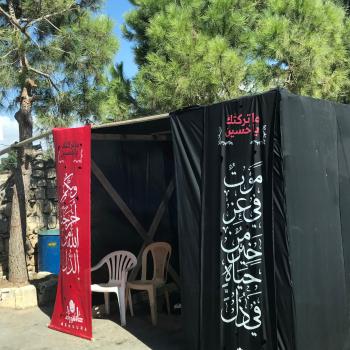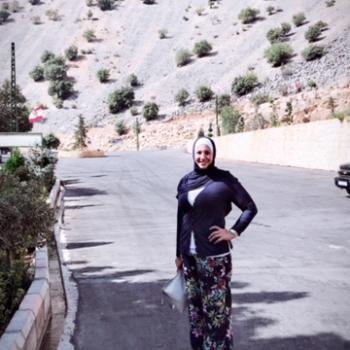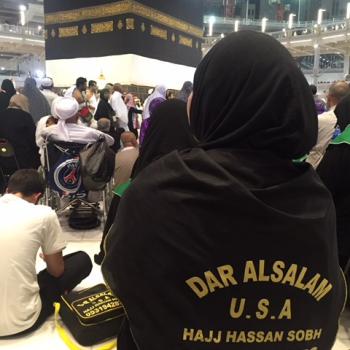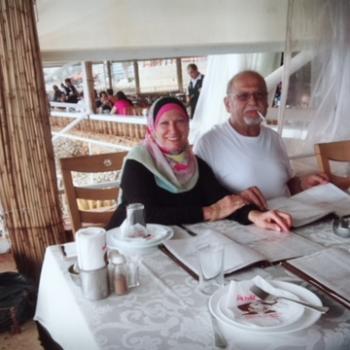Embracing Human Dignity
There is so much disregard and disrespect for humanity. Many have forgotten what it means to live with kindness.
Treating people with respect and courteous behavior is not a new concept. Embracing human dignity is as easy as buttoning your shirt.
You bring warmth to the hearts of others around you by being gracious and compassionate. We should focus on how to positively impact the lives of others around us.
Racism and misogyny is a global issue
In social, professional or personal capacities, I watch people treat one another in inappropriate and demeaning ways.
Racism is not exclusive to the U.S. or western colonial societies. It is prevalent in the Arab world and is widespread across the region. Witnessing it is heartbreaking.
I currently live in a nation with distressingly poor regulations and wages for domestic and foreign workers. Many within the foreign workforce come from Asian and African nations.
Treated as third class citizens, they are disrespected beyond measure. It is appalling to witness, though is much better than what it used to be.
I often bear witness to inappropriate comments and racial and ethnic slurs hurled at foreigners. There is a feeling of superiority people have over these hardworking individuals seeking opportunity.
Stripping them of the dignity and failing to speak to them with compassion, the victim’s hurt and pain is visible during these incidences.
Campaigning for change
Campaigns by civil and human rights organizations to stop discrimination are gaining momentum. One in particular that is of great importance is the campaign to end the use of the term abed (slave). This Arabic word has been used and taught to describe black people for centuries.
There are people who simply know no other word. It is the term they learned in school or by family. When correcting them, they accept the correct term of aswad (black) and go about their day.
For those who know the meaning of the term and lack respect for others, they use abed without caution or care. These are the ignorant folks who need reminding that racism is a serious issue and they’re partaking in it.
From sexual harassment, domestic violence, and mental health and disability awareness to substance abuse prevention and changing racist vocabulary terms, these campaigns are vital to our changing society.
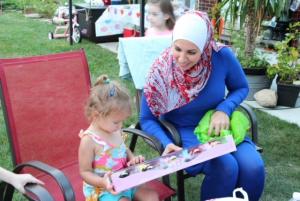 Teach them young
Teach them young
We need to educate our children on how to be compassionate and aware global citizens.
If we start teaching respect for self and others at a young age and lead by example, future generations of you will be more understanding.
We need to begin addressing these issues and changing the way we view the world.
There is a stark reality of suffering that we cannot continue to gloss over and ignore.
Stop it when you see it
Gratefully, I am confident enough to stop people in their moments of ignorance and provide them insight or clarify their error.
Some get upset, others are appreciative, and some simply quietly replace the word and move on.
Do not ever feel uncomfortable when trying to educate someone to use appropriate behaviors, terms or means of communication.
I have noticed that whether living in the east or west, like other global societies, issues regarding discrimination are alive and well. No matter where I go, I am sure I will find it.
I ask for God to keep me focused and strong to stand up to it.
Since when was being sociable unfavorable?
I am outspoken, willful, and gregarious. This offends some people who cannot handle my personality. Some would rather me avoid sharing my opinion and be more reserved.
Audaciously, some have even asked that I not be “too vocal with my opinions.”
Working for over 25 years to help communities advance, I have sat in meetings where male leaders dared to marginalize me and stifle my voice.
I was taught to speak up for myself and make my place at the table. I forge ahead even harder when I notice others trying to push me to the side.
Earning my seat at the table, I am not afraid to be bold or brazen.
Seek guidance from a role model
I have learned from strong women in leadership to stand for what I believe in and maintain strong convictions. It was not my concern if others believed in those same ideals or not.
My parents urged us to think for ourselves. We were encouraged to share our thoughts, stand against injustice, and fight for what we believed in.
Not everyone wants to be around women who are unafraid to say what is on their mind or push back against the status quo.
Women rule the world
This is a hardship I face, each and every day, as a single, 39 year old female, whether in Beirut or in Dearborn.
When in doubt, I seek guidance from the phenomenal women in my life. Their expertise and wisdom cannot be learned in a classroom.
My mother, sisters, friends and colleagues have taught me to pave my journey with wisdom, life lessons, quality advice and realistic goals.
These remarkable women have left an indelible mark on my life.
One important lesson I value is to never be afraid to admit your flaws and seek ways to turn your weaknesses into strengths.
Having adab (Manners)
I have heard men share that when a woman is too gracious, kind, or considerate, she may be viewed as being “overfriendly.”
The queen of greetings, I often ask people of their well-being or use the expression, “Allah ya3teek al a3fe” (May God give you strength). I say this to any and every one. People will ask me, “Why you are so nice to people?”
Being social or respectful should be no cause for alarm or disdain.
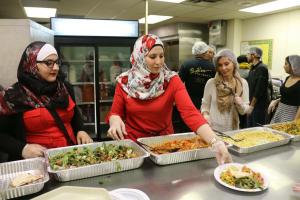 I was raised to have good manners and treat ALL people with decency, courtesy, and respect.
I was raised to have good manners and treat ALL people with decency, courtesy, and respect.
Whether the mailman, kids next door, or the gas station attendant, greeting people with a smile and wishing them a blessed day can go a long way.
Participating in community service projects help to keep individuals engaged and focused on social justice, humanitarian, and political issues.
These things keep you connected to community and the needs of others.
Three ways I embrace kindness
Not every person will understand why those who live with kindness will do the things they do.
There are three simple things I seek to embrace in my life in order to be mindful of how I treat people.
-
Treat others with dignity
“We have bestowed dignity on the children of Adam; provided them with transport on land and sea; given them for sustenance things good and pure; and conferred on them special favors, above a great part of our creation.” (Qur’an 17:70)
We are ALL created by the greatest of Creators. Not just Arabs. And not just Muslims.
Not one individual, no matter his/her affluence, influence, or stature that is superior to another.
As people of faith, we are expected to respect the dignity of others and their right to life, freedom, and security.
Mistreating an innocent person based on their race, origin, faith, gender, etc is inappropriate and far from what Islam teaches us.
Yes! Even the service staff
While out and about in Beirut, people are surprised at my intentional conversations with staff of places we visit.
I enjoy hearing people’s stories and often ask where they are from or how they came to be in Beirut.
I do not adhere to this culture of classism and narcissism that many Arab nations have. It is rampant in the Michigan community as well.
Making a conscientious effort, I greet human beings with love and good manners. The least of my concerns is their bank account balance or social status.
Whether the waiter, owner, or guy who puts charcoal on my hookah (water pipe), each person deserves to be treated with dignity and respected for their work.
It’s about human connections
Learning about other’s journeys is intriguing. Some stories make you laugh or cry, leave you inspired or resigned.
No matter the story, the fact that you asked someone to share their life with you creates a beautiful connection.
Asking meaningful and thoughtful questions brings comfort to another soul, especially one who may be struggling. You never know the impact your question or kindness will have on someone.
I try my best to really see and listen to people. Engaging in conversations to learn and understand an individual can be quite powerful.
Respect for ALL
As a Muslim, I am expected to respect ALL of humanity, not just those who look, speak, practice, or behave like me.
Regardless of faith, acting kindly towards your brother or sister in humanity is the way we should always conduct ourselves.
The Holy Qur’an and faith of Islam teaches us that no person has the right to deny another their entitlement to dignity. There is nothing written that this is specific to Muslims.
I have witnessed disrespect and racism daily, both in the U.S. and the Middle East. It is blatant, disturbing, and inhumane. It needs to stop.
-
Recognize our shared humanity
“And hold firmly to the rope of Allah all together and do not become divided. And remember the favor of Allah upon you – when you were enemies and He brought your hearts together and you became, by His favor, brothers. And you were on the edge of a pit of the Fire, and He saved you from it. Thus Allah does make clear to you His verses that you may be guided.” (Qur’an, 3:103).
I am grateful for parents who encouraged us to branch out of our insular community in Metro Detroit. Growing up, I had friends of every ethnicity, race and faith.
Many of my closest and most trusted friends are non-Muslims. Whether since birth, like Danielle Jarvis, or for a decade like Josephine Dries, our respect for one another transcends religious lines.

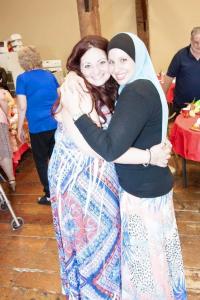
Not always do we agree on issues or see eye to eye on lifestyle choices, though we respect one another’s opinions and decisions.
Recognizing our diversity, we engaged in meaningful conversations to understand both our similarities and differences.
Our shared love for humanity and living with compassion towards others is what binds us.
As the old saying goes, “treat others the way you wish to be treated.” This holds strong and true and was a strong basis of our upbringing.
I do my best to live by this.
(pictured on left, Josephine Dries, and right, Danielle Jarvis)
That Side-Eye
Watching today’s youth speak to their elders with contempt and insolence is depressing and oftentimes revolting.
Had I dared to raise my voice to an elder, I would have been slapped upside the head by my parents (or a neighbor, community member, cousin, etc).
I am 39 and still cringe when my mom shoots me the side-eye and I know she wants to scold me. Respect for your elders was a given. I do not see that in the west or the east, these days.
Being the activist that I was at an early age, I helped to organize a walk out while in high school.
While sitting with the principal and my mother in his office, he made a claim that I refuted. I was sitting to my mother’s left and said, sharply, “That is NOT what I said!”
My mother darted a look at me and with complete grace and swiftness, back-handed me on my mouth. “Don’t you EVER raise your voice to an adult,” she murmured.
I certainly didn’t do that again.
Please, not the disappointment
To disappoint or upset my parents is not an option. I respect them too much and never want them to be dissatisfied with my behavior or actions.
As a child, I feared the wrath of the flying sermaye (slipper). I am unsure as to why some parents have retired it to the Hall of Fame of Mysterious Flying Objects. *giggles* I still recall the severity of the slipper being thrown. There was so much meaning behind it. Remember the George W. Bush shoe throwing scandal! Slippering is serious!
Whatever the reason, all I knew was that respecting others was ingrained at a very young age and our manners were a reflection of our upbringing, faith, and parents.
Some may call it, “instilling the fear of God in a child,” where others simply see it as having a strong foundation based on morality and respect for others.
Whatever the reason is, let respect continue to triumph over disregard.
-
Do your best to avoid gossip
O’ you who have true faith! If one who publicly and openly commits sins brings you any news (concerning another person) then ascertain its truthfulness carefully (before you spread it) lest you harm people through (your own) ignorance (through accepting and following false reports) and then regret what you have done.” (Qur’an, 49:6)
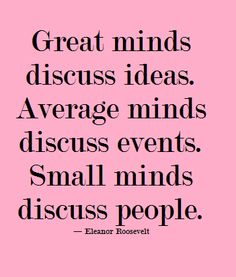 While out with a friend the other day in Lebanon, we spoke about ridding our lives of toxic people.
While out with a friend the other day in Lebanon, we spoke about ridding our lives of toxic people.
Since moving to Lebanon and being away from Dearborn’s insular community, I am far from the rivers of gossip that flow freely there.
Being away from certain types of toxicity has helped my soul to recharge. Listening to people talk about others is of no interest to me.
Who got married or divorced, is cheating or in jail, is useless information to me. It does not aid in my personal or professional growth and does not pay my bills.
There are bigger fish to fry in life and wasting time on nonsense and 7akki fadhi (empty talk) proffers no benefit to my existence.
Excuse yourself from the toxic conversations
“And pursue not that of which you have no knowledge; for every act of hearing, or of seeing or of (feeling in) the heart will be inquired into (on the Day of Reckoning). (Qur’an 17:36)
There were moments I would be out with friends and would excuse myself for a random reason, just to walk away from the gossip.
Whether pretending I am on a call, going to the bathroom, or leaving, I made a choice to not engage.
It is not easy to remove yourself from situations like that. It usually occurs when you are with those closest to you and puts you in an awkward position.
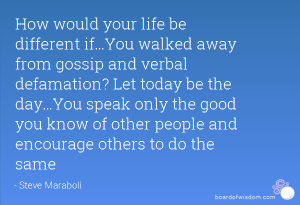
These moments leave me turning the saying over in my head, “Who gossips to you, will gossip of you.” I sincerely believe this.
I have learned, the hard way, that gossip benefits no one and that I am more concerned with God’s view of me than His creation.
Speaking ill of others is a testament to your lack of integrity and principle.
My circle is small and filled with people who discuss topics of interest and engage in intelligent conversations.
I have committed myself to enjoying the moments I am blessed with and staying focused on being present.
Making an effort to truly enjoy the company of the people I am with has made me genuinely appreciate my relationships.
My smile is not an invitation
I learned that kindness and courtesy can be easily misinterpreted in the Middle East.
I am going to take a long shot and attribute this issue to a lack of social priming with outside communities or to living in insular societies.
Extensively traveling through this region, I have had many experiences in understanding how to deal with people from different cultures. I have noted that my extroverted personality and gregarious smile and laugh need to be toned down in some situations.
Each situation is different and since learning some valuables lessons, I have become more conscious of my behavior while traveling.
These kinds of misinterpretations can lead to other concerns or problems. I make an effort to be more conscious of people’s response to my kindness and smile so they are not misconstrued as flirtation.
Be conscious of your surroundings
Being followed to a destination for saying hello or smiling can and may happen; stay alert at all times.
I have had some scary experiences from simply smiling or saying hello to a stranger in passing. Always be aware of your surroundings and trust your instincts.
Displaying good manners towards humanity does not constitute an open invitation for inappropriate behavior.
Each society is different and we need to remind ourselves to remain gracious yet to be conscious of our surroundings.
Stay kind
At the end of the day, stay kind, folks. A good disposition and polite demeanor makes the world so much easier to enjoy and navigate.
You never know how people are feeling or what they are dealing with. Your smile and acknowledgement can make all the difference to how their day continues or ends.


